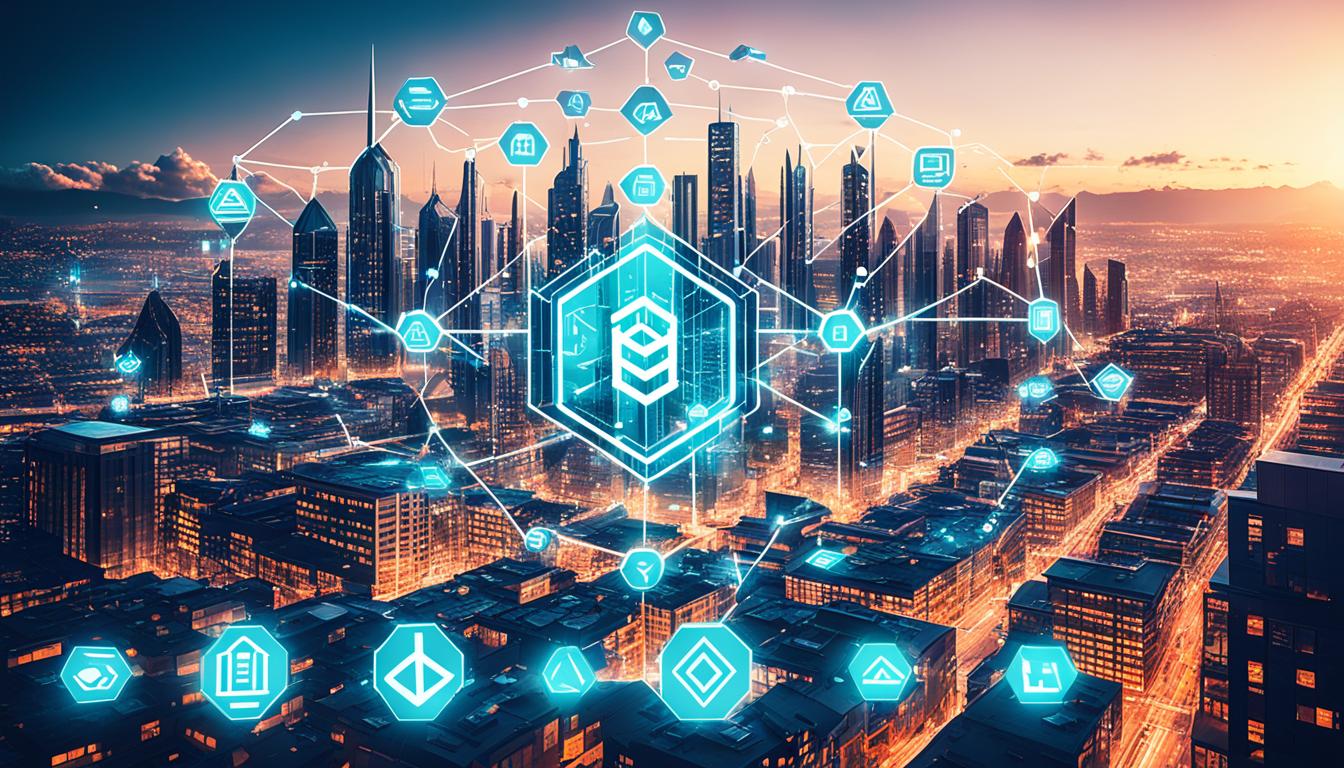Did you know that the volume of tokenized digital securities in the real estate market is projected to reach $5 trillion by 2030? That’s a staggering figure, considering that the real estate tokenization market size was just $2.7 billion in 2022. This exponential growth demonstrates the increasing adoption and potential of tokenizing real estate assets using blockchain technology. By leveraging artificial intelligence (AI) and smart contracts, real estate tokenization offers a transformative way to invest in properties. In this article, we will explore the concept of real estate tokenization, its advantages, and the future prospects of this innovative investment approach.
Key Takeaways:
- Blockchain technology has paved the way for real estate tokenization, representing real estate assets as digital tokens on a blockchain.
- The volume of tokenized digital securities in the real estate market could reach $5 trillion by 2030.
- Real estate tokenization offers advantages such as increased liquidity, fractional ownership, transparency, and security.
- There are risks associated with real estate tokenization, including regulatory uncertainty and technical vulnerabilities.
- The market for real estate tokenization is expected to grow exponentially in the coming years, reshaping the real estate investment industry.
What is Real Estate Tokenization?
Real estate tokenization refers to the process of creating a digital representation of a real estate asset on a blockchain. This digital representation is divided into fractions, allowing investors to purchase smaller portions of the asset.
By leveraging blockchain technology, real estate tokenization offers several benefits. Firstly, it opens up the real estate market to smaller investors by reducing barriers to entry and enabling them to participate in property investment. Fractional ownership allows for more accessible and affordable investments, diversifying portfolios.
Moreover, the use of smart contracts automates the operational process, ensuring transparency, accuracy, and security. These self-executing contracts eliminate the need for intermediaries like agents, banks, and legal representatives, making transactions faster and more cost-effective.
Blockchain technology plays a crucial role in real estate tokenization. It provides an immutable and trustworthy system where all transactions and ownership records are recorded and accessible on the blockchain. This transparency enhances trust and reduces fraud, giving investors confidence in their investments.
Real estate tokenization is reshaping the property investment industry, providing greater liquidity and flexibility. It empowers investors with the ability to diversify their portfolios, optimize returns, and participate in the digital economy.
Advantages and Risks of Real Estate Tokenization
Real estate tokenization offers several advantages that make it an attractive option for investors. These advantages include:
- Increased liquidity: By dividing real estate assets into smaller tokens, tokenization allows for wider participation and faster liquidation of properties. Investors can buy and sell these tokens more easily than traditional real estate assets, increasing market liquidity.
- Fractional ownership: Tokenization enables fractional ownership, allowing investors to purchase smaller portions of high-value properties. This opens up real estate investment opportunities to a wider range of investors who may not have enough capital to buy a whole property.
- Transparency: Blockchain technology provides a transparent and immutable ledger where all transactions and ownership records are recorded. This eliminates the need for intermediaries and ensures transparent and auditable real estate transactions.
- Security: Real estate tokenization offers enhanced security features compared to traditional transactions. The use of smart contracts ensures that transactions are executed as programmed and reduces the risk of fraud.
Despite its advantages, real estate tokenization also poses certain risks that investors should be aware of:
- Regulatory uncertainty: One of the main challenges is the lack of a consistent regulatory framework for real estate tokenization. Different jurisdictions have varying rules and regulations around digital assets, creating a complex landscape for investors and token issuers.
- Lack of industry knowledge: The real estate industry may be hesitant to adopt tokenization due to a lack of knowledge and understanding about blockchain technologies. This lack of awareness can slow down the adoption of tokenization and potentially limit its benefits.
- Technical risks: Smart contracts, which automate the tokenization process, can also pose technical risks. Potential loopholes and vulnerabilities in smart contract code can be exploited by malicious actors, leading to financial loss and reputational damage.
Despite these risks, the advantages of real estate tokenization have the potential to revolutionize the real estate industry, offering new investment opportunities and streamlining traditional processes.
Conclusion
Real estate tokenization, powered by AI and blockchain technology, is transforming the property investment landscape. With its ability to offer increased liquidity, fractional ownership, transparency, and security, real estate tokenization presents an enticing opportunity for investors. Despite the challenges and risks surrounding regulatory frameworks and technical vulnerabilities, the future prospects for this market are promising.
As technology continues to advance, we can anticipate more innovative features and advancements that will reshape the real estate investment industry. The growth potential of the real estate tokenization market is staggering, with projections showing exponential expansion in the coming years. This bodes well for investors looking to maximize their returns and participate in the future of smart property investments.
By embracing real estate tokenization, investors can gain access to a previously inaccessible market, benefit from the fractional ownership model, and enjoy enhanced liquidity. Additionally, the transparency and security afforded by blockchain technology create a trustworthy system that can streamline transactions and remove unnecessary intermediaries. As the industry matures and evolves, real estate tokenization has the potential to revolutionize how we invest in properties.
FAQ
What is real estate tokenization?
What are the advantages of real estate tokenization?
What are the risks associated with real estate tokenization?
How does real estate tokenization benefit smaller investors?
How does blockchain technology ensure transparency and security in real estate tokenization?
Source Links
- https://www.forbes.com/sites/digital-assets/2024/03/20/real-estate-tokenization-a-start-of-a-new-era-in-property-management/
- https://medium.com/@smartmaitech/a-guide-on-how-to-get-started-with-tokenized-real-estate-f31c20e72feb
- https://www.linkedin.com/pulse/real-estate-tokenization-revolutionizing-property-robin-ubaghs

Leave a Reply